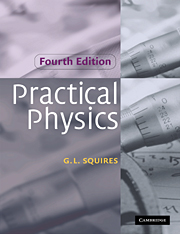Book contents
- Frontmatter
- Contents
- Preface to the fourth edition
- Preface to the first edition
- 1 The object of practical physics
- PART 1 STATISTICAL TREATMENT OF DATA
- PART 2 EXPERIMENTAL METHODS
- 6 Some laboratory instruments and methods
- 7 Some experimental techniques
- 8 Experimental logic
- 9 Common sense in experiments
- PART 3 RECORD AND CALCULATIONS
- APPENDICES
- Solutions to exercises
- Some useful books
- References
- Index
8 - Experimental logic
Published online by Cambridge University Press: 05 June 2012
- Frontmatter
- Contents
- Preface to the fourth edition
- Preface to the first edition
- 1 The object of practical physics
- PART 1 STATISTICAL TREATMENT OF DATA
- PART 2 EXPERIMENTAL METHODS
- 6 Some laboratory instruments and methods
- 7 Some experimental techniques
- 8 Experimental logic
- 9 Common sense in experiments
- PART 3 RECORD AND CALCULATIONS
- APPENDICES
- Solutions to exercises
- Some useful books
- References
- Index
Summary
Introduction
Systematic error is just a euphemism for experimental mistake. Such mistakes are broadly due to three causes:
(a) inaccurate instruments,
(b) apparatus that differs from some assumed form,
(c) incorrect theory, that is, the presence of effects not taken into account.
We have seen the remedy for the first – calibrate. There is no blanket remedy for the other two. The more physics you know, the more experience you have had, the more likely you are to spot the effects and hence be able to eliminate them. However, there are ways of making measurements, of following certain sequences of measurements, which automatically reveal – and sometimes eliminate – certain types of error. Such procedures form the subject of the present chapter. Some are specific, others are more general and add up to an attitude of mind.
Finding and eliminating a systematic error may sound a negative, albeit desirable, object. But there is more to it than that. The systematic error that is revealed may be due to a phenomenon previously unknown. It is then promoted from an ‘error’ to an ‘effect’. In other words, by careful measurement we may make discoveries and increase our understanding of the physical world.
Apparent symmetry in apparatus
It is a good rule that whenever there is an apparent symmetry in the apparatus, so that reversing some quantity or interchanging two components should have no effect (or a predictable effect – see the second example), you should go ahead and make the change.
- Type
- Chapter
- Information
- Practical Physics , pp. 102 - 116Publisher: Cambridge University PressPrint publication year: 2001



